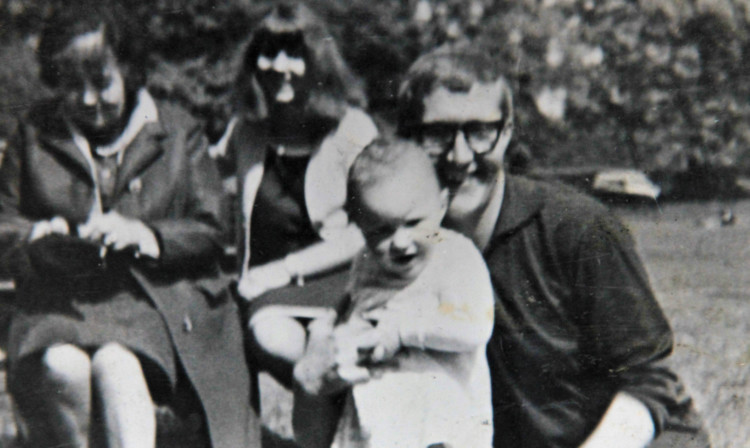
A woman’s 32-year search for her long-lost sister ended in heartbreak after discovering she’d been murdered.
Lynne Millar, from Kirkcaldy, was separated from older sibling Gaynor when she was just 18 months old. The sisters were fostered out to different families after their mum Lydia abandoned them and their dad Raymond admitted he couldn’t cope.
Lynne, who is now 50, launched a desperate search to find Gaynor when she was a teenager, but kept coming unstuck. It later turned out it was because Gaynor had been registered in her mother’s maiden name.
Eventually, Lynne’s husband, Frank, tracked down a Gaynor Peterson, who had been stabbed to death in Liverpool when she was 38. After checking with the police, the couple discovered the murder victim was Lynne’s sister.
Lynne said: “I was beside myself with grief to find I had lost Gaynor in such a brutal way and that my search had ended so painfully. All of my hopes of catching up with her ended in such an ugly way and I was inconsolable.”
Lynne only discovered she had a sister when she spotted a photo of a similar looking girl in her grandparents’ house when she was 13 and quizzed them about it. They told her how she’d been separated from her as an infant, but never let on their surnames were different.
Lynne later discovered her grandparents had been seeing both sisters regularly but conspired to keep it a secret.
Lynne recalled: “I vowed to find her when I grew up and the search began when I turned 18. But Gaynor’s different surname, Peterson, made it almost impossible as I was looking for someone called Hudson, which was my maiden name.”
After years of trawling fruitlessly through records, Frank discovered Gaynor had been killed in the early hours of August 19, 2001, when she was stabbed four times in the neck and shoulder.
The killer, John Lowrie, who was 19 at the time, was found guilty of her murder by a jury. He was ordered to be detained for life and told he would serve at least 14 years behind bars.
It meant Lynne’s dreams of a reunion with her sister had been shattered forever. As she searched through newspaper stories about the murder she then discovered she and Gaynor had spent much of their lives living within 15 miles of each other in and around Liverpool, the city of their birth.
A trial at Liverpool Crown Court in 2001 heard that John Lowrie randomly stabbed his neighbour Gaynor with a 12-inch knife. She had fallen asleep on a sofa during a party at her flat.
Lowrie was overheard saying: “I’m going to kill her.” A witness recounted that he grabbed her hair, pulled her head back and stabbed her four times in the throat. The severity of her injuries meant she died within minutes. He would later try to blame another party-goer for the attack.
Later Lowrie told police: “It was stupid. I don’t know why I did it.” After Lowrie was sentenced, Detective Inspector Nikki Holland said: “Lowrie never told us why he did it. It is a complete mystery.”
The trial judge was aghast at the random butchery. He said: “This was a brutal, apparently motiveless murder. You have denied your guilt throughout and sought to blame an innocent man for the killing.”
Lynne never knew her in life, but does everything she can today to keep her spirit alive.
She has also launched a Facebook wall dedicated to her sister. It is called Say No to Knives With Gaynor’s Law.
To compound their nightmare Lowrie is due for release on the anniversary of Gaynor’s death August 19.
“It would be a devastatingly cruel blow for us making my sister’s murder even more difficult to bear if he were released,” added Lynne.
Now, in a bid to spare other families similar grief, she has launched a national petition to fight knife crime. She wants tougher sentences for knife attacks and no chance of sentences being reduced.
“I never got to see Gaynor again and it is unbearable to think that other families are left to suffer after lives are callously ended by savage stabbings,” Lynne added.
Go to Lynne’s petition hereDriven to find family
Siblings parted in childhood are driven to find one another because of their genetic link, says leading psychology professor Paddy O’Donnell, of Glasgow University.
Those connected by genes have an in-built need to seek out and protect each other. This is shown by the popularity of genealogy web-sites worldwide, he believes.
“We know from research that people are programmed to look for and protect the genes they hold in common with others,” said Professor O’Donnell. “There is also a huge cultural need to belong to a family.”
He added that the desperate desire to campaign when a family member is murdered is accelerated by a wish to right a terrible wrong.
“It is a common and natural response in coping with a death that could have been prevented,” he concluded.

Enjoy the convenience of having The Sunday Post delivered as a digital ePaper straight to your smartphone, tablet or computer.
Subscribe for only £5.49 a month and enjoy all the benefits of the printed paper as a digital replica.
Subscribe